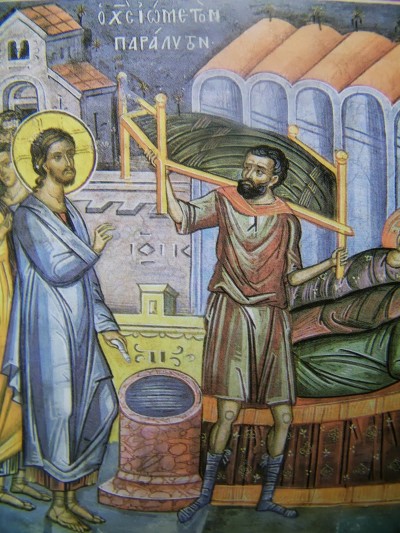To seek what is human, to give what is divine
 The physician who does not suffer infirmities, knows not how to cure infirmities.
The physician who does not suffer infirmities, knows not how to cure infirmities.
This was the lesson before the Holy Gospel at Matins this morning. Saint Peter Chrysologus at his best!
From a Homily by St Peter Chrysologus, Bishop and Doctor
Today’s lesson makes clear to us that Christ in his human actions wrought divine mysteries, and that in his visible works he had in mind invisible ends. “Entering into a boat,” it says, “he passed over the water and came into his own city.” Is this not he who thrusting aside the waves of the sea laid bare its deeps, that the people of Israel might pass on dry ground through the midst of fearful waves as between mountains? Is this not he who supported the feet of Peter upon the crests of the waves, so that his watery path upon the sea stayed firm beneath his step? And why does he deny himself the service of the sea, to make the brief crossing of the lake in a hired boat? “Entering into a boat”, it says, “he passed over the water.”
And why should we wonder, brethren? Christ came to take upon him our infirmities, and confer on us his powers; to seek what is human, to give what is divine; to receive injuries, and return them with honours; to suffer affliction, and bring healing to others: for the physician who does not suffer infirmities, knows not how to cure infirmities; and he who is not weak with the weak, cannot bring health to the weak. Christ therefore, had he remained within his own powers, would have had nothing in common with men; and unless he conformed to the way of life of our body, his taking of flesh would have been in vain. He therefore shared our necessities, that by these human needs he might be proved a true man.
“Entering into a boat”, it says. Christ enters the ship of his Church, that he may calm at all times the waves of the world; that he may conduct those who believe in him by a tranquil voyage to their heavenly country; and make fellow citizens of his own city, those He had made sharers of his humanity. It is not Christ therefore who needs the ship, but the ship that needs Christ; for without its Heavenly Pilot the ship of the Church would be unable to pass through the sea of the world, amid so many and such great hazards, and reach the heavenly harbour. “Entering into a boat”, it says, “he passed over the water and came into his own city”. The Creator of all things, the Lord of the whole world, after he had for our sake confined himself within our body, began to have a human country, began to be a citizen of the country of Judea. He began to have parents, who was the Parent of all men, that his love might draw, his charity attract, his affection win, his humanity persuade those whom the devil had driven away, fear had scattered, divine law made exiles.
